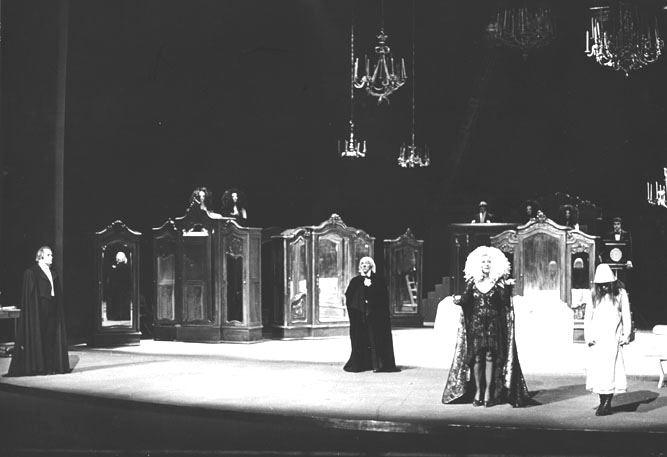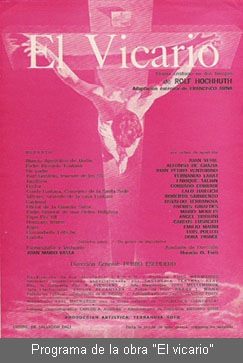
THEATER IN BUENOS AIRES
 Politti
felt like he had met all possible professional expectations in his
native province of Mendoza and aspired towards further growth in
Buenos Aires. His decision was stronger than his fear of the large
city and his precarious economic situation, and so he searched for
the means to make the move. “Suddenly, I felt the need to connect
with another type of experience. I felt distressed, like what I had
learned with Tomalcheva and done in Mendoza were totally different
things. I longed to expand my mind…I had been thinking about it for
quite some time but the opportunity had not presented itself. Then
one day it did, by means of a contest hosted by the National Arts
Fund, for actors living outside of the country’s capital. The winner
would receive a six-month scholarship to perfect his or her learning
with teachers like Oscar Fessler and Antonio Cunill Cabanellas. I
won the scholarship and in 1966 came to Buenos Aires definitively,
despite the fact that the scholarship only covered my hotel
expenses. I was decided. I did not come to Buenos Aires in search of
fame, but rather came in search of possibilities, which in Mendoza
were limited. When I had used up the scholarship, the struggle began
because I had to cover my expenses with whatever came out of my own
pocket. I got back in touch with the people I had met during
previous trips – Pedro Escudero, in particular. The latter ended up
trusting me with a role in the play “El vicario,” which was produced
by Osvaldo Terranova who had run into a lot of trouble with
censorship. Three months of rehearsals ended in just under a week of
performances in Buenos Aires, a week in La Plata and another week in
Córdoba.”
Politti
felt like he had met all possible professional expectations in his
native province of Mendoza and aspired towards further growth in
Buenos Aires. His decision was stronger than his fear of the large
city and his precarious economic situation, and so he searched for
the means to make the move. “Suddenly, I felt the need to connect
with another type of experience. I felt distressed, like what I had
learned with Tomalcheva and done in Mendoza were totally different
things. I longed to expand my mind…I had been thinking about it for
quite some time but the opportunity had not presented itself. Then
one day it did, by means of a contest hosted by the National Arts
Fund, for actors living outside of the country’s capital. The winner
would receive a six-month scholarship to perfect his or her learning
with teachers like Oscar Fessler and Antonio Cunill Cabanellas. I
won the scholarship and in 1966 came to Buenos Aires definitively,
despite the fact that the scholarship only covered my hotel
expenses. I was decided. I did not come to Buenos Aires in search of
fame, but rather came in search of possibilities, which in Mendoza
were limited. When I had used up the scholarship, the struggle began
because I had to cover my expenses with whatever came out of my own
pocket. I got back in touch with the people I had met during
previous trips – Pedro Escudero, in particular. The latter ended up
trusting me with a role in the play “El vicario,” which was produced
by Osvaldo Terranova who had run into a lot of trouble with
censorship. Three months of rehearsals ended in just under a week of
performances in Buenos Aires, a week in La Plata and another week in
Córdoba.”
His time at the San Martín Theater
A new
encounter between Politti and Pedro Escudero would seal the actor’s
participation in the San Martín Theater’s full-time cast. During six
years, Politti participated in twelve productions, which not only
allowed him to achieve great recognition among the critics and the
public, but also secured him a vital experience for his professional
growth. He went from Shakespearian play to Shakespearian play.
Between “Coriolanus” and “Macbeth,” he performed in “La novia de los
forasteros,” “El juez de los divorcios,” “La cabeza del dragón,”
“Adriano VII,” “Rosencrantz and Guildestern Are Dead,” “Romance de
lobos,” “Cremona,” “Yvonne, Princess of Burgandy,” “El círculo de
tiza caucasiano” and “Antígona Vélez.”
Excerpts from “Luis Politti: cadencias y otros cielos”,
Fabián Stolovitsky
Ediciones Corregidor, Buenos Aires, 1995

